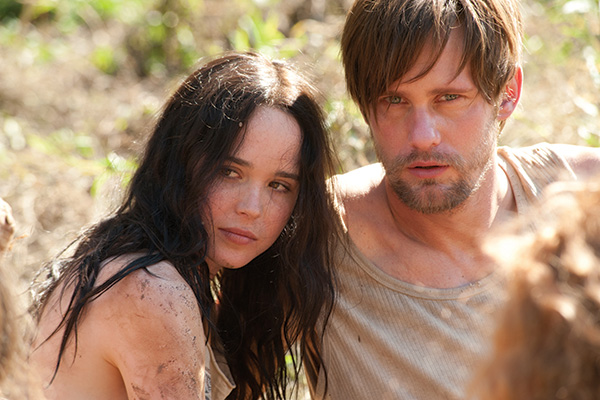The East
Director: Zal Batmanglij
A rare environmental-political thriller, The East represents one of the bigger-budgeted and more purely enjoyable options from the 2013 film festival. It’s a curious combination of The Departed meets Martha Marcy May Marlene, and combines the best talent from American indie cinema (Patricia Clarkson and Ellen Page) in an effective thriller that is just as unrealistic as it is inspiring. Investigating the thin line between activism and terrorism, the film is an idealistic take on corporate America and a social revolution against its wrongdoings.
The titular group is a ragtag assembly of outsiders, each with a personal vendetta that prompts them to target corporate honchos who have committed gross violations of ethical and environmental codes in search of bigger profits. Through social media (which they use as skillfully as the Kony2012 activists, only, you know, genuinely), they expose their motives and gain mass popularity. Brit Marling plays Jane, an impossibly classy and intelligent former FBI worker, now taking orders from a private intelligence firm. Her clients demand she expose the group as the “terrorists” they are. In order to do so, she must first infiltrate a group of radical environmentalists who can lead her to the hierarchy of the East.
Having done so, she discovers a group of zealous, but seemingly passive, intellectuals. They are not the extremist cult she, or the audience, expects – their more eccentric rituals extend only to bathing one another and feeding one another dinner before being fed themselves. Naturally, despite their eye-for-an-eye policies at first repelling her, she finds herself drawn to the charisma and heady idealism of the group, in both a personal and professional capacity.
We realise that for each member, the missions do not have a political so much as an emotive agenda. Indeed, there is only one scene allocated to an ethical discussion of what they are about to do – the rest of the time they act out of mere self-righteousness, which Jane at first loathes but is ultimately seduced by. One is thankful that the film doesn’t spell out each character’s motives and internal dilemma. Instead, the director treats his audience as being intelligent enough to not only navigate the film’s twists, but also impose their own moral compass on Marling’s central blank canvas of a character. Indeed, The East is not arrogant enough to posit any suggestions to the threats posed by corporate America, other than to condemn violence as part of the solution.
To reveal anymore would spoil the surprises of the third act, but as Jane’s ethical position fluctuates, so too does the audience’s, and this is undoubtedly a film to incite much post-credits debate. Whenever I assumed to know where the film was going, it would take a different route and a different ethical dilemma would arise. Under different direction, this constant pirouetting might be tiresome, but here the audience is enjoyably kept on their toes. Similarities abound between the cultish aspect of this film and the director’s first effort (last year’s The Sound of My Voice), in which Marling also took the lead role.
Marling’s grounded presence carries the film through some of its less believable elements, and the audience is willing to follow her charismatic and credible persona through all the third-act twists and plot contrivances. She is that rare actor who conveys entire thought processes with mere looks.
Supposedly the writing duo of Marling and director Zal Batmanglij spent a summer pursuing the anarchist lifestyle, dumpster-diving, living off the land and hitching rides across the North-East in an attempt to enhance the veracity of the script. Though aspects of the film are somewhat difficult to swallow (e.g. their innate ability to disappear after each act of terrorism, despite not using disguises or pseudonyms), its tone is never preachy or sanctimonious. In a way, it is a wish-fulfilment fantasy for the 99 per cent that Hollywood would typically avoid – corporate hogs receiving their comeuppance in increasingly inventive fashions that eschew our conventions of morality and bring bigger questions into the fray. This is a confident and mature second feature from this duo, and raises the stakes for their third effort.






